-
 Bitcoin
Bitcoin $88,354.9846
1.30% -
 Ethereum
Ethereum $1,585.1570
-2.87% -
 Tether USDt
Tether USDt $1.0000
0.03% -
 XRP
XRP $2.0950
-1.00% -
 BNB
BNB $601.2750
0.03% -
 Solana
Solana $138.7714
-1.69% -
 USDC
USDC $1.0000
0.01% -
 Dogecoin
Dogecoin $0.1615
0.76% -
 TRON
TRON $0.2468
0.27% -
 Cardano
Cardano $0.6281
-1.60% -
 Chainlink
Chainlink $13.2373
-2.60% -
 UNUS SED LEO
UNUS SED LEO $9.1021
-2.96% -
 Avalanche
Avalanche $20.1085
0.64% -
 Stellar
Stellar $0.2508
0.12% -
 Toncoin
Toncoin $2.9308
-3.06% -
 Shiba Inu
Shiba Inu $0.0...01247
-1.43% -
 Sui
Sui $2.2499
2.17% -
 Hedera
Hedera $0.1703
-0.51% -
 Bitcoin Cash
Bitcoin Cash $344.9911
1.61% -
 Hyperliquid
Hyperliquid $18.3271
0.87% -
 Litecoin
Litecoin $78.9540
-0.58% -
 Polkadot
Polkadot $3.7860
-3.64% -
 Dai
Dai $0.9999
-0.01% -
 Bitget Token
Bitget Token $4.4576
-1.00% -
 Ethena USDe
Ethena USDe $0.9991
-0.01% -
 Pi
Pi $0.6327
-1.82% -
 Monero
Monero $215.1854
-0.20% -
 Pepe
Pepe $0.0...08022
2.96% -
 Uniswap
Uniswap $5.3079
-2.18% -
 OKB
OKB $50.9891
-0.24%
What are the common scams in ETH trading?
Beware of ETH trading scams like phishing, Ponzi schemes, fake ICOs, and impersonation; always verify platforms and use secure communication to protect your investments.
Apr 18, 2025 at 10:56 pm

Introduction to ETH Trading Scams
Ethereum (ETH), as one of the leading cryptocurrencies, attracts a significant amount of trading activity. However, with high trading volumes come increased risks, particularly from scammers looking to exploit unsuspecting traders. Understanding the common scams in ETH trading is crucial for protecting your investments and navigating the market safely. This article will detail various prevalent scams, how they operate, and steps you can take to safeguard your assets.
Phishing Scams
Phishing scams are one of the most common threats in the cryptocurrency world, including ETH trading. These scams typically involve fraudsters posing as legitimate entities to trick you into revealing sensitive information such as your private keys or login credentials.
- Fake Websites: Scammers create websites that look identical to legitimate trading platforms or wallet services. They may send you an email or message with a link to this fake site, urging you to log in or enter personal information.
- Email and Message Scams: You might receive an email or message that appears to be from a reputable source, such as your exchange or wallet provider, asking you to confirm your account details or update your password.
- Social Engineering: Scammers may use social media or messaging platforms to impersonate someone you trust, like a friend or a well-known figure in the crypto community, to trick you into sending them ETH or revealing sensitive information.
To protect yourself from phishing scams, always double-check the URL of any website before entering personal information, use two-factor authentication (2FA) wherever possible, and never share your private keys or seed phrases with anyone.
Ponzi and Pyramid Schemes
Ponzi and pyramid schemes are fraudulent investment operations that promise high returns with little risk. In the context of ETH trading, these schemes often involve promises of high returns from trading or investing in ETH-related projects.
- Ponzi Schemes: These schemes pay returns to earlier investors using the investments of more recent investors. The scheme leads investors to believe that profits are coming from legitimate business activities when, in reality, the money is just being shuffled between investors.
- Pyramid Schemes: These schemes require participants to recruit new members, with the promise that they will earn money from the recruits' investments. The structure is unsustainable and collapses when there are no more new recruits.
To avoid falling victim to Ponzi and pyramid schemes, be wary of any investment opportunity that promises high returns with little to no risk. Always conduct thorough research on the project or platform before investing, and be skeptical of any scheme that relies heavily on recruiting new members.
Fake ICOs and Token Scams
Initial Coin Offerings (ICOs) and token sales have been a popular way to raise funds for new blockchain projects, but they have also become a breeding ground for scams. Fake ICOs and token scams involve fraudsters creating fake projects to steal investors' ETH.
- Fake Whitepapers and Websites: Scammers create professional-looking whitepapers and websites to make their fake ICOs appear legitimate. They may promise revolutionary technology or high returns to lure investors.
- Pump and Dump Schemes: In some cases, scammers may create a token, artificially inflate its price through coordinated buying (pumping), and then sell their holdings (dumping), leaving other investors with worthless tokens.
- Rug Pulls: A rug pull occurs when the developers of a project suddenly abandon it and run off with investors' funds. This can happen after the token has been listed on exchanges and the price has been pumped.
To protect yourself from fake ICOs and token scams, thoroughly research any project before investing. Look for red flags such as anonymous teams, lack of a clear roadmap, and promises of unrealistic returns. Use reputable sources to verify the legitimacy of the project and its team.
Fake Exchanges and Trading Platforms
Fake exchanges and trading platforms are another common scam in the ETH trading space. These platforms may appear legitimate but are designed to steal your ETH or personal information.
- Fake Trading Interfaces: Scammers create websites that look like real trading platforms. They may allow you to deposit ETH but then make it impossible to withdraw your funds.
- Exit Scams: Some fake exchanges operate for a period of time, allowing users to trade and withdraw funds to build trust. Once they have accumulated a significant amount of ETH, the operators shut down the platform and disappear with the funds.
- Fake Apps: Scammers may also create mobile apps that mimic legitimate trading platforms. These apps can steal your login credentials or private keys when you enter them.
To avoid falling victim to fake exchanges and trading platforms, always use well-known and reputable exchanges. Verify the URL of the platform before entering any personal information, and be cautious of any platform that promises unusually high returns or has poor user reviews.
Impersonation Scams
Impersonation scams involve fraudsters posing as someone else to trick you into sending them ETH or revealing sensitive information. These scams can take various forms in the ETH trading space.
- Impersonating Celebrities or Influencers: Scammers may create social media accounts or use messaging platforms to impersonate well-known figures in the crypto community. They may promise to double your ETH if you send them a certain amount or claim to have insider information about upcoming projects.
- Impersonating Customer Support: Fraudsters may pose as customer support representatives from exchanges or wallet services. They may contact you claiming there is an issue with your account and ask you to provide personal information or transfer funds to resolve it.
- Impersonating Friends or Family: Scammers may hack into the social media or messaging accounts of your friends or family members. They may then contact you, pretending to be in need of financial assistance and asking you to send them ETH.
To protect yourself from impersonation scams, always verify the identity of the person you are communicating with. Be cautious of any unsolicited messages, especially those asking for personal information or funds. Use secure communication channels and never share sensitive information over unsecured platforms.
Frequently Asked Questions
Q: How can I verify the legitimacy of an ETH trading platform?
A: To verify the legitimacy of an ETH trading platform, start by researching the platform's reputation through online reviews and forums. Check if the platform is registered with relevant financial authorities and has a clear privacy policy and terms of service. Look for user testimonials and any history of security breaches or scams associated with the platform. Additionally, ensure the platform uses HTTPS and has strong security measures in place, such as two-factor authentication.
Q: What should I do if I suspect I've been scammed in an ETH trading scheme?
A: If you suspect you've been scammed, immediately stop all communication with the scammer and do not send any more funds. Report the scam to the platform where it occurred, if applicable, and to law enforcement agencies. Document all interactions with the scammer, including emails, messages, and transaction details. Contact your bank or payment provider to see if you can reverse any transactions. Lastly, seek advice from a professional in the cryptocurrency space to understand your options for recovery.
Q: Are there any tools or services that can help protect me from ETH trading scams?
A: Yes, there are several tools and services designed to help protect you from ETH trading scams. Use reputable antivirus software and anti-phishing tools to protect against malicious websites and emails. Consider using hardware wallets for storing your ETH, as they offer an additional layer of security. Services like Etherscan can help you verify transactions and smart contract addresses. Additionally, joining reputable cryptocurrency communities and forums can provide valuable insights and warnings about potential scams.
Disclaimer:info@kdj.com
The information provided is not trading advice. kdj.com does not assume any responsibility for any investments made based on the information provided in this article. Cryptocurrencies are highly volatile and it is highly recommended that you invest with caution after thorough research!
If you believe that the content used on this website infringes your copyright, please contact us immediately (info@kdj.com) and we will delete it promptly.
- Meteora Labs sued by investors over alleged M3M3 token price manipulation
- 2025-04-22 09:40:12
- This is a published version of our weekly Forbes Crypto Confidential newsletter. Sign up here to get Crypto Confidential days earlier free in your inbox.
- 2025-04-22 09:40:12
- Trump Token Unlocks Are When a Group of People—Usually Project Team Members, Early Investors or Advisors—Receive Their Allocated Tokens
- 2025-04-22 09:35:14
- Meme cryptocurrency Dogecoin is currently trading at an important support level against Bitcoin
- 2025-04-22 09:35:14
- Dogecoin (DOGE) Price Broke Out of Two Technical Patterns, Setting the Stage for a Bullish Run
- 2025-04-22 09:30:12
- Mutuum Finance (MUTM) Presale Raises Over $7M From 8400+ Buyers
- 2025-04-22 09:30:12
Related knowledge
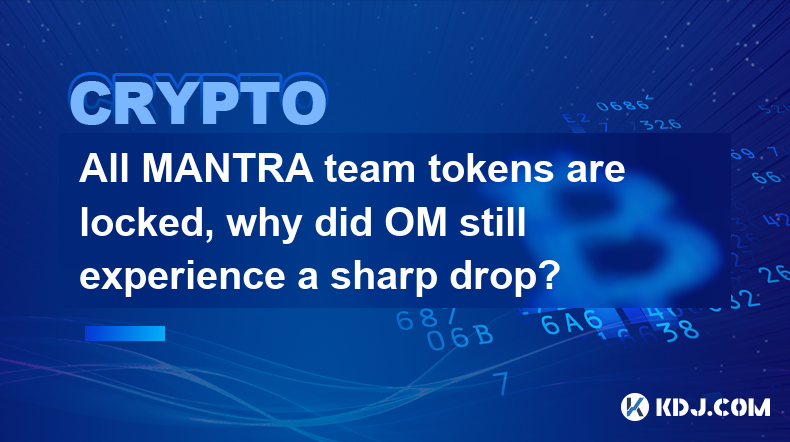
All MANTRA team tokens are locked, why did OM still experience a sharp drop?
Apr 20,2025 at 11:14am
Introduction to MANTRA and OM TokenThe MANTRA project is a blockchain platform that aims to provide a scalable and secure environment for decentralized applications (dApps). The native token of the MANTRA ecosystem is OM, which plays a crucial role in governance, staking, and other functionalities within the platform. Recently, the MANTRA team announced...
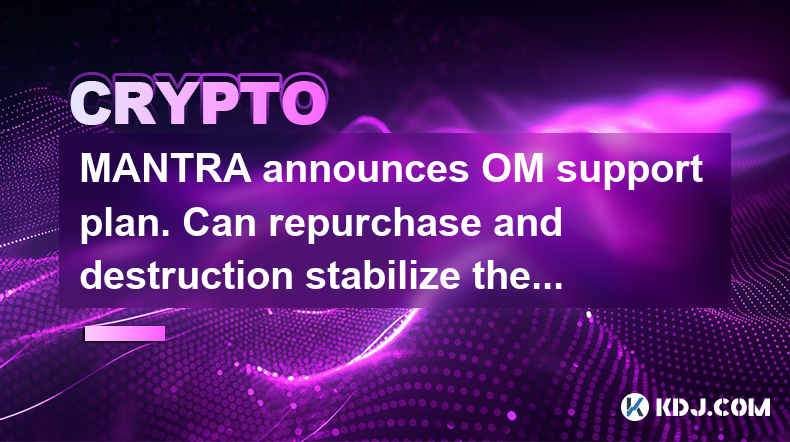
MANTRA announces OM support plan. Can repurchase and destruction stabilize the currency price?
Apr 21,2025 at 01:57pm
MANTRA, a notable player in the cryptocurrency ecosystem, has recently announced an OM support plan that includes mechanisms for repurchasing and destroying tokens. This move has sparked significant interest and discussion within the crypto community, particularly around its potential impact on the stability of the OM token's price. In this article, we ...

A large amount of OM was liquidated due to collateralization, causing a sharp drop? MANTRA analyzes the reasons for the market turmoil
Apr 21,2025 at 01:57am
The cryptocurrency market is known for its volatility, and sharp price movements can often be attributed to a variety of factors. Recently, a large amount of OM (Mantra DAO's native token) was liquidated due to collateralization issues, leading to significant market turmoil. In this article, MANTRA analyzes the reasons behind this event and the subseque...
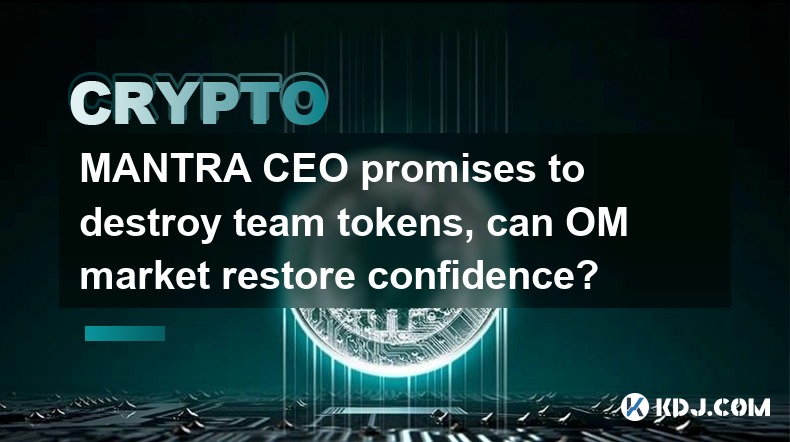
MANTRA CEO promises to destroy team tokens, can OM market restore confidence?
Apr 21,2025 at 08:28am
The recent announcement from the CEO of MANTRA about destroying team tokens has sparked a wave of discussions within the cryptocurrency community. This move is seen as a strategic effort to restore confidence in the OM market, which has been facing various challenges. The decision to burn team tokens is not just a simple action; it involves a series of ...
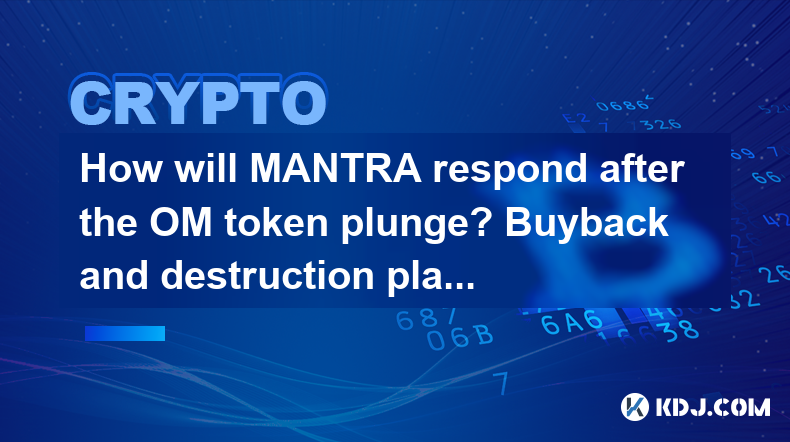
How will MANTRA respond after the OM token plunge? Buyback and destruction plan revealed
Apr 19,2025 at 11:42pm
The recent plunge in the OM token price has left many investors and enthusiasts of the MANTRA ecosystem concerned about the future stability and value of their holdings. In response to these market fluctuations, MANTRA has announced a comprehensive buyback and destruction plan aimed at restoring confidence and supporting the long-term health of the OM t...
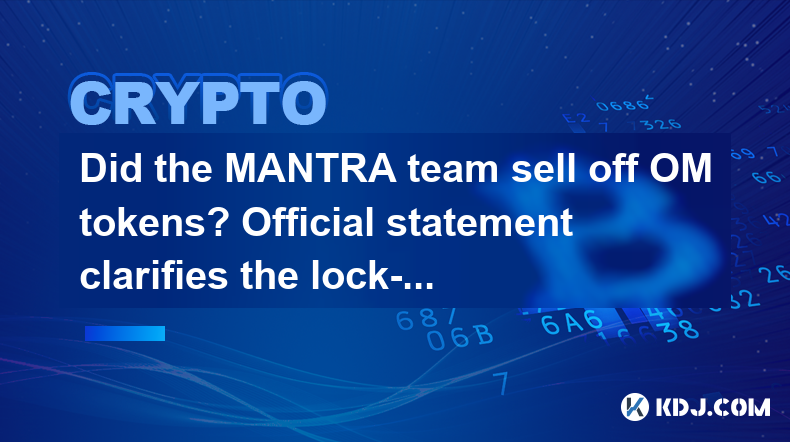
Did the MANTRA team sell off OM tokens? Official statement clarifies the lock-up situation
Apr 19,2025 at 10:56pm
The recent buzz around the MANTRA project and its native token, OM, has led to speculation and concerns within the cryptocurrency community about whether the MANTRA team has sold off their OM tokens. To address these concerns and clarify the situation, the MANTRA team has released an official statement detailing the lock-up situation of their tokens. Th...

All MANTRA team tokens are locked, why did OM still experience a sharp drop?
Apr 20,2025 at 11:14am
Introduction to MANTRA and OM TokenThe MANTRA project is a blockchain platform that aims to provide a scalable and secure environment for decentralized applications (dApps). The native token of the MANTRA ecosystem is OM, which plays a crucial role in governance, staking, and other functionalities within the platform. Recently, the MANTRA team announced...

MANTRA announces OM support plan. Can repurchase and destruction stabilize the currency price?
Apr 21,2025 at 01:57pm
MANTRA, a notable player in the cryptocurrency ecosystem, has recently announced an OM support plan that includes mechanisms for repurchasing and destroying tokens. This move has sparked significant interest and discussion within the crypto community, particularly around its potential impact on the stability of the OM token's price. In this article, we ...

A large amount of OM was liquidated due to collateralization, causing a sharp drop? MANTRA analyzes the reasons for the market turmoil
Apr 21,2025 at 01:57am
The cryptocurrency market is known for its volatility, and sharp price movements can often be attributed to a variety of factors. Recently, a large amount of OM (Mantra DAO's native token) was liquidated due to collateralization issues, leading to significant market turmoil. In this article, MANTRA analyzes the reasons behind this event and the subseque...

MANTRA CEO promises to destroy team tokens, can OM market restore confidence?
Apr 21,2025 at 08:28am
The recent announcement from the CEO of MANTRA about destroying team tokens has sparked a wave of discussions within the cryptocurrency community. This move is seen as a strategic effort to restore confidence in the OM market, which has been facing various challenges. The decision to burn team tokens is not just a simple action; it involves a series of ...

How will MANTRA respond after the OM token plunge? Buyback and destruction plan revealed
Apr 19,2025 at 11:42pm
The recent plunge in the OM token price has left many investors and enthusiasts of the MANTRA ecosystem concerned about the future stability and value of their holdings. In response to these market fluctuations, MANTRA has announced a comprehensive buyback and destruction plan aimed at restoring confidence and supporting the long-term health of the OM t...

Did the MANTRA team sell off OM tokens? Official statement clarifies the lock-up situation
Apr 19,2025 at 10:56pm
The recent buzz around the MANTRA project and its native token, OM, has led to speculation and concerns within the cryptocurrency community about whether the MANTRA team has sold off their OM tokens. To address these concerns and clarify the situation, the MANTRA team has released an official statement detailing the lock-up situation of their tokens. Th...
See all articles






















































































